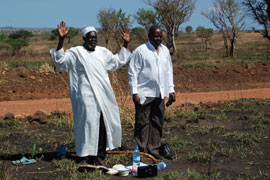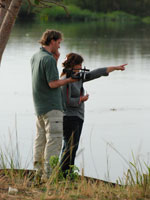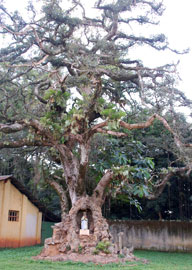(D11) The Lord's Resistance Army

The project investigates the way in which religion and politics are interwoven through using the current, 22-year long conflict in Northern Uganda, its causes, progress and particularly its settlement as an example. Elements from Christianity, Islam and traditional cosmology are converted into metaphors in myths and rituals and are imparted in dramatic stagings of the rebel leaders and prophets, who are possessed by the spirits. Moreover, the various procedures will be investigated by which peace or rather “normality” is to be (re)gained in the postwar situation of Acholi society in Northern Uganda: on a supranational level (International Criminal Court), on a national level (peace treaty, amnesties, army) and on a local level (rituals). Which of these sometimes conflicting procedures are met with social acceptance under which conditions, or why they fail, will be the object of analysis.

The project aims to gather and analyse information through ethnological research in order to be in a position to assess the social problems that can be found in Uganda and other regions of Africa based on facts. The investigation of the Ugandan conflict in its cosmological and historical relations widens the cluster of excellence’s approach because the relationship of politics and religion proves to be generally different in African societies compared to in Europe. Conversely, the plurality of fields involved in the cluster of excellence permits a broader access to topics such as legal pluralism, prophethood and biblical texts. Due to its integration into the cluster of excellence, the research has the potential to significantly influence the methodology of interdisciplinary conflict studies. The work in this project is dedicated to support a habilitation and the production of the ethnological film “Fighting Spirits, Geister (be-)kämpfen” [Fighting (against) spirits] which has since been completed.
Cosmological violence and causes of conflict
Results from interviews with representatives of public institutions and churches and with Acholi informants in the North point to a very complex, heterogeneous picture of the cause and settlement of conflict, thus allowing the research questions to be defined more precisely. To an increasing extent, the experience of violence among the Acholi turns out to be a primarily religious experience. Insofar as both the cluster of reasons for the conflict, the course of conflict and the acts of violence themselves up to the different approaches to the settlement of conflict are placed into cosmological relations, physical violence suffered is interpreted as cosmological violence. As research has proven, this interpretative model applies to all socio-morphological levels of a society. Individual suffering is as much defined in socio-cosmological exchange relationships as in the sensitivities of families, clans and the whole society. Violence, illness and misfortune experienced by individuals are always transferred into social sensitivities. Thus, problems that were initially experienced individually spread into society, gaining tremendously in proportion. The rhetoric of violence is currently being expressed in Northern Uganda, and it is documented in the film project particularly as a cosmological concept of violence.
Due to a “gap” in ethnological research, which is a consequence of the dictatorships since the 1970s and the last two decades of war in Northern Uganda, the project is a contribution to basic research. Outside of the “conventional” ethnological work, the events in Northern Uganda are to be defined within the framework of a “debate on modernity”. Of the different approaches to and theories of modernity, which are being discussed controversially at the cluster, many cannot be applied to the East African example without difficulty. Randeria’s concept of entangled modernity, however, allows a methodical approach to the complexity of Ugandan circumstances. On the one hand, it deals with the historically “entangled” background to the conflict, but on the other hand, it also deals with the different procedures for settling the conflict that are currently being applied in Northern Uganda.

The peace process, which is as old as the conflict itself, is stuck in an overabundance of procedures in Uganda (warrants of the International Criminal Court in The Hague; peace negotiations, amnesty laws and military operations on a national level; allegedly traditional “peace rituals” on a local level). The concept of religious or, respectively, of legal pluralism does not appear to be sufficient on site in order to comprehend more profoundly the relationships and interrelations of the single and partially contradictory approaches. From an “emic” perspective, the attribution of meaning is often perceived as a fundamental breach with “tradition”. People illustrate the distinction between a “modern” war and the forays and blood feuds of earlier times by means of the weaponry, changing from spears to guns. However, the “modernisation” of war entails processes of intensifying ideas of spirits. Old and new forms of prophets, who communicate in the form of possession by spirits, accompany processes of secularisation, globalisation and militarisation. Performance, staging and “ritual drama” form part of the analytical “tools” that help to state and distinguish the instrumentalisation of rituals for the objectives of the policy of peace in current affairs.
Ethnological long-term perspective
Within the scope of various contacts with representatives of other disciplines who are concerned with conflicts in the region, the ethnological perspective − unlike normatively oriented peace and conflict studies − proves to be a necessary requirement for the understanding of violent conflicts. The ethnological long-term perspective in particular, which the cluster project enables, allows the documentation and interpretation of the interpretative processes and the change in justification patterns of the players involved (among others, rebels, the population, public institutions and donor organisations). The question as to how almost forgotten rituals are promoted and staged locally as local knowledge by outsiders, and whether social acceptance is ultimately achieved, can only be answered satisfactorily through long-term observation. Even within ethnology, there are hardly any role models in this regard. Only the long-term-perspective will show who is ascribed interpretative power through which processes, and whether cosmological relations can be organised and exercised more flexibly.
Within the social reconstruction of the Acholi society, a medicalised, body-centred and individualised discourse about societal and social “healing” prevails. Currently, an investigation of local and international linguistic usage and of widespread biologistic metaphors is still pending. So far, it has become apparent that the terms used among the Acholi and in international development discourse of violence as a social “trauma”, of ritual as a “collective therapy” or of rebels as society’s “cancer” are indeed similar, but they are based on entirely different concepts. It has long been known from the ethnological perspective that religion and politics in this region is perceived as an inseparable entity.
For the example of the Acholi, however, an investigation is needed of how this entity is experienced practically, given the discrepancies with the modern Ugandan state and the impact of globalisation. Moreover, data on the concept of the person and on the role of the images of maleness are to shed light on a “warrior’s ethos” of the Acholi and, thus, on the social position of the rebels. The myths that represent the cosmological basis for the Acholi’s political structure need to be documented in their local variations. Today, the relations between the clans and their country are essential in understanding political and ritual authority.

